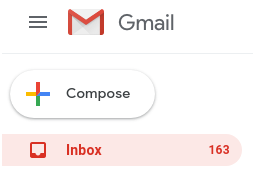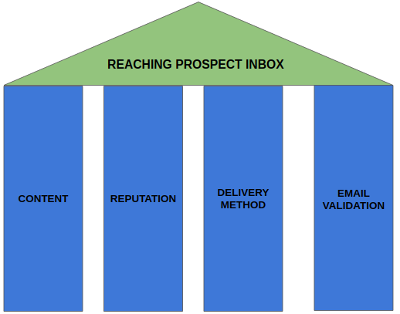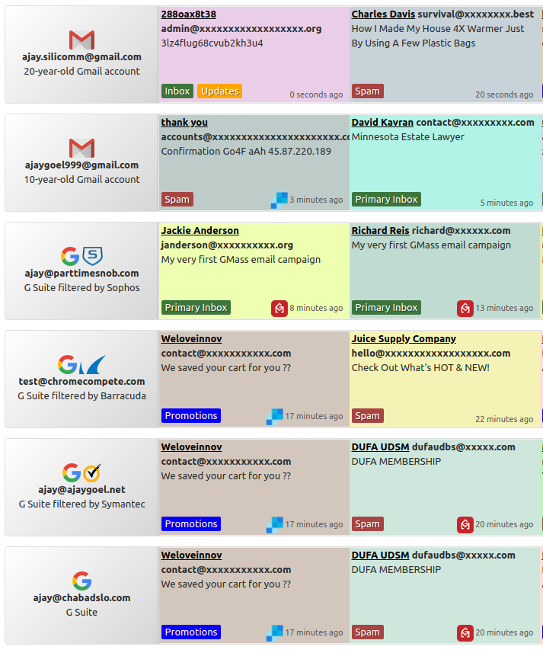The Cold Mailing Deliverability Checklist
by Anas El MhamdiWhen I worked as a growth hacker at Nimley, a lead generation company specializing in email copywriting, I was responsible for managing B2B acquisition through cold emailing. The primary challenge our team faced was deliverability—specifically, combating spam filters that resulted in sub 20% open rates after sending hundreds of emails.

This poor deliverability had cascading consequences:
- Damaged domain reputation requiring setup on new domains
- Unpredictable lead generation forecasting
- Significant account management overhead
By implementing systematic improvements across four key areas, we achieved a steady 60%+ open rates across the board and generated 70K€ MRR using cold mailing as our main acquisition channel (90% of our leads). The key insight: results scale with volume when implemented systematically.
Important: In Europe, respect GDPR by sending only to business email addresses, not personal ones.
The Four Pillars Framework

Successful cold emailing depends on four interconnected pillars that work together to ensure inbox placement:
- Content - The form and substance of your email messages
- Email Validation - Confirming recipient addresses actually exist
- Delivery Method - How and at what volume emails are sent
- Reputation - Domain and IP standing with email providers
Let’s dive deep into each pillar.
1. Content: Form and Substance
Form Recommendations
Avoid external links and images in cold emails. Spam filters (Gmail’s especially) are very strict about external resources linked to an email from an unknown sender. While HTML formatting is acceptable, I strongly recommend keeping emails clean and simple.
Signatures should use plain text formatting only. Here’s what I recommend:
- Professional name
- Title
- Phone number
- Address
- Domain link
Nothing more. No fancy graphics, no social media icons, no images.
Substance Strategy
The golden rule: Do not sell your product, create a conversation.
This stems from two critical factors:
- Spam detection algorithms identify overly promotional language patterns
- Readers recognize and manually mark aggressive pitches as spam, damaging your sender reputation
Examples of what to avoid:
- “Save $X by subscribing today”
- “Offer of a lifetime”
- “You’ll never want to miss this”
- “Limited time only”
- Any superlative claims or urgency language
Instead: Focus on initiating dialogue through conversational tone and clear call-to-action questions like:
- “Do you have 15 spare minutes to talk about it this week?”
- “Are you available for a quick call on Tuesday?”
- “Would you be interested in learning more about how we solved [specific problem]?”
Recommended Email Structure
The Nimley team used this five-part format consistently:
- Introduction (few words)
- Company introduction (1 sentence maximum)
- Problem presentation (1 sentence)
- Value proposition (1 sentence)
- Strong call-to-action (few words)
Keep it tight, focused, and conversational.
The Power of Personalization
Customization significantly improves response rates. Even basic first-name personalization demonstrates attention and increases engagement.

A Backlinko study demonstrated that personalization has a measurable impact on email engagement metrics.
2. Email Validation
This section is straightforward but non-negotiable:
DO NOT SEND ANYTHING TO UNVALIDATED EMAILS.
Every bounce damages your sender reputation and domain standing with email providers. Using validation services may “cut your databases in half, but you’re actually just finding out its real size.”
Recommended validation tools:
- Verifalia
- Neverbounce
These services verify that email addresses actually exist before you send, identifying genuinely contactable addresses and removing those that will bounce.
3. Delivery Method
Two approaches work effectively for cold email delivery:
Option 1: Established Email Platforms
Services like Mailchimp and Mailjet have established reputations with spam filters and receive favorable treatment. They handle much of the technical infrastructure for you.
Option 2: Alternative Solutions
If using APIs, SaaS platforms, or custom SMTP solutions, you must implement proper delays and rate limiting:
The rule of thumb when you’re cruising is to send about 500 maximum per day per domain at a rate of 1 to 2 emails per minute.
Domain Warming Protocol
New domains require gradual reputation building. You cannot immediately send 500 emails per day from a brand new domain. Here’s the protocol I used:
- Start conservatively: 50 emails per day
- Gradual increase: Add approximately 30 emails in volume per day
- Timeline: Reach 500 daily maximum over two weeks
For a stricter warming protocol, check out Reply.io’s recommendations.
Scaling beyond 500 emails/day: Use multiple domains or subdomains while maintaining the same rate limits on each.
4. Domain and IP Reputation
Authentication Setup
Implement SPF (Sender Policy Framework) and DKIM (DomainKeys Identified Mail) before sending any campaigns.
These security protocols:
- Verify domain ownership and legitimacy
- Provide reputation cushion during establishment
- Take approximately 5 minutes to configure via DNS records
If you’re using Google Workspace, their tutorials make setup straightforward. Your email provider will give you the DNS records to add to your domain configuration.
Reputation Monitoring
Gmass Inbox
A simple testing tool that provides test email addresses. You send your emails to these addresses, and Gmass shows you whether they landed in the inbox or spam folder.

Pro tip: Send casual test messages like “Hey how are you, how about dinner tomorrow?” to see realistic placement results.
GlockApps
An API-based solution for monitoring reputation at scale across multiple domains. It offers a comprehensive UI for tracking domain reputation and inbox placement rates—essential when managing multiple sending domains.
The Complete Checklist
Content
- ✓ Initiate conversation rather than selling
- ✓ Personalize all messages (at minimum, use first names)
- ✓ Use conversational call-to-action questions
- ✓ Keep subject lines simple (meeting requests, call requests, problem-focused)
- ✓ Exclude links and images from email body
- ✓ Use plain text signatures only
Email Validation
- ✓ Validate all addresses before sending
- ✓ Use Verifalia or Neverbounce
- ✓ Never send to unvalidated addresses
- ✓ Accept that validation may cut your database significantly
Delivery Method
- ✓ Maximum 500 emails daily per domain
- ✓ Send at rate of 1-2 emails per minute
- ✓ Gradually increase volume over two weeks for new domains
- ✓ Start at 50 emails/day, add ~30/day incrementally
- ✓ Scale across multiple domains for higher volumes
Domain Reputation
- ✓ Configure SPF and DKIM before first send
- ✓ Maintain all other guidelines consistently
- ✓ Monitor regularly with Gmass Inbox or GlockApps
- ✓ Test with realistic casual messages
- ✓ Track inbox vs spam placement rates
Results and Next Steps
I achieved 70K€ MRR with cold emailing representing 90% of acquisition, demonstrating that these practices scale effectively with volume when implemented systematically.
Once your campaigns generate replies, you’ll need proper CRM integration and prospect data enrichment to manage the pipeline effectively—but that’s a topic for another article.
The key takeaway: deliverability isn’t about tricks or hacks. It’s about respecting the inbox, following best practices consistently, and building reputation gradually. Master these four pillars, and your cold emails will consistently reach their intended recipients.